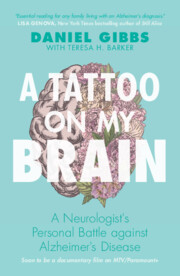Book contents
- A Tattoo on My Brain
- Reviews
- A Tattoo on My Brain
- Copyright page
- Dedication
- Contents
- Acknowledgments
- Introduction
- Prologue
- 1 Beacon Rock
- 2 Forewarned and Forearmed
- 3 The Smell of Baking Bread
- 4 Sneak Preview
- 5 A Stubborn Puzzle
- 6 The Locked Box and the Family Tree
- 7 The Measure of Memory
- 8 Orcas Nonetheless
- 9 My Brain, My Self
- 10 The Reveal
- 11 Cognitive Reserve and Resiliency: Brain Cells in the Bank
- 12 My Experimental Life
- 13 When ARIA Is More than an Operatic Solo
- 14 My Experiential Life: Living with Early-Stage Alzheimer’s Disease
- 15 Madeleines, Music and African Doves
- 16 It’s Only Scary If You Look Down
- 17 Beyond DNA: Family History Reconsidered
- 18 News at 5: Retired Neurologist Battles Alzheimer’s
- 19 The Forest, the Trees and the Ground Beneath My Feet
- 20 What’s in a Name? Alzheimer’s Reimagined
- 21 A Meaningful Outcome
- Epilogue: The Writing Life
- Epilogue: The Writing Life, Act II
- Appendix:
- Resources
- Index
- References
14 - My Experiential Life: Living with Early-Stage Alzheimer’s Disease
Published online by Cambridge University Press: 12 November 2022
- A Tattoo on My Brain
- Reviews
- A Tattoo on My Brain
- Copyright page
- Dedication
- Contents
- Acknowledgments
- Introduction
- Prologue
- 1 Beacon Rock
- 2 Forewarned and Forearmed
- 3 The Smell of Baking Bread
- 4 Sneak Preview
- 5 A Stubborn Puzzle
- 6 The Locked Box and the Family Tree
- 7 The Measure of Memory
- 8 Orcas Nonetheless
- 9 My Brain, My Self
- 10 The Reveal
- 11 Cognitive Reserve and Resiliency: Brain Cells in the Bank
- 12 My Experimental Life
- 13 When ARIA Is More than an Operatic Solo
- 14 My Experiential Life: Living with Early-Stage Alzheimer’s Disease
- 15 Madeleines, Music and African Doves
- 16 It’s Only Scary If You Look Down
- 17 Beyond DNA: Family History Reconsidered
- 18 News at 5: Retired Neurologist Battles Alzheimer’s
- 19 The Forest, the Trees and the Ground Beneath My Feet
- 20 What’s in a Name? Alzheimer’s Reimagined
- 21 A Meaningful Outcome
- Epilogue: The Writing Life
- Epilogue: The Writing Life, Act II
- Appendix:
- Resources
- Index
- References
Summary
The grilled chicken chunks on Lois’s plate glisten with the olive oil, herbs and spices we always use to marinate them before we set the skewers on the grill. Juicy chunks of red pepper, green pepper and onion punctuate the spaces between the tastefully charred chicken bites. Nestled in a bed of brown rice, the whole thing looks like she just lifted her plate from the cover of Bon Appe´tit magazine. Mine, not so much. We are on Day Two of the two-day pre-test elimination diet for an Alzheimer-related clinical trial. More accurately, I am. Researchers are testing an ancient medicinal herb to see how long a specific dose of this extract lasts in my system. In animal studies, a very concentrated tea they’ve made from this plant produces cognitive improvement in a mouse model of Alzheimer’s disease. They hope it will have that effect in humans.
- Type
- Chapter
- Information
- A Tattoo on my BrainA Neurologist's Personal Battle against Alzheimer's Disease, pp. 102 - 119Publisher: Cambridge University PressPrint publication year: 2023



